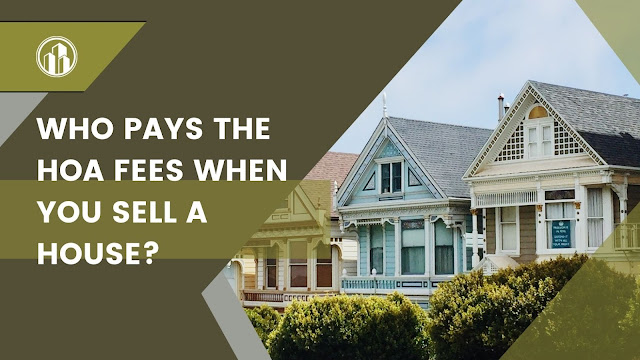Who Pays the HOA Fees When You Sell a House?
HOA fees or homeowner association fees are dues covered by the homeowner in a particular Association, condo complex, condo building, or subdivision. Typically these fees are paid either monthly, quarterly, or annually. When it comes time to sell the property, the question of who pays the final HOA fees can get a little cloudy. When you are buying and selling in a community that is governed by a homeowners association, there are extra considerations that need to be made. Regardless of what type of home you are buying, buyers and sellers both will incur a list of closing costs that need to be paid the homeowner association may also have additional transfer fees on top of the closing costs.
What Are HOA Fees?
Homeowner associations are responsible for managing the housing development or condo building and collecting fees from the homeowners to cover costs associated with the community’s maintenance. This fee varies based on the amount of maintenance and amenities a certain development has. For instance, a condominium building that has a variety of amenities such as swimming pools, tennis courts, or fitness centers may require a higher association fee than a subdivision that has no amenities. The only HOA fees that may have to be paid are for managing the subdivision rather than maintenance on buildings or services.
HOA Transfer Fees
HOA transfer fees are typical fees that may occur when a property is transferred from one owner to another. They typically cover the cost associated with documents, preparing information, supplying the new homeowner with the rules and conditions and property inspection records. The HOA must disclose any applicable transfer fee to all parties before selling the property. While either buyer or seller can pay this transfer fee, it’s typically the responsibility of the seller that pays the HOA transfer fee.
These fees can vary from one community to the next and are typically established by the property management company. They are charged based on the specific type of services that the HOA provides to buyers and sellers involved in a transaction. State law can also come into play when it comes to transfer fees. Some states allow HOA’s to charge transfer fees for costs directly associated with copying, distributing documents, and gathering information.
Who Pays for HOA Fees at Closing?
HOA dues can be prorated at closing. Most associations will collect dues on a monthly or annual basis but if the homeowner has already paid for the month or the year and then decides to sell the house, the buyer will pay into the closing costs the prorated leftover amount. In most property sales situations, the buyer shoulders most of the costs. This may include appraisal fees, insurance, credit report fees, notary, fees and courier fees. However, in the case of HOA fees, because the seller has already used Association amenities and services for the year or the month, the fees will be prorated.
HOA Disclosure Requirements
An HOA disclosure will include all the documents that the new owner will need about the HOA. These will be the bylaws, covenants, conditions, restrictions, rules and any financial documents as well as amendments that may have been made over the years. It may also include an answer to a list of frequently asked questions. This disclosure allows new owners to know the rules and how the community is governed. This will also inform the new owner how and when to pay monthly dues. Most of these documents are extensive, sometimes up to 300 pages or more. Sellers should expect to pay a disclosure fee between $200-$600 to print out and access the disclosure forms for the buyer. Most of the time, the seller is responsible for providing the new owner with these disclosure documents.
More: What do HOA Fees Cover?
Closing Letter
Buyers will receive an HOA closing letter to inform the buyer of any dues attached to the home purchase at closing. Associations typically require that any balance for the home must be paid at the time it is sold. This should be considered part of the offer price of the home. If there are unpaid HOA fees, a closing attorney may be required. The Board of Directors for the Association will need to complete and submit a closing letter on time before the closing date.
Can you collect unpaid HOA fees after closing?
If for some reason the home closes and there are still HOA fees to be paid, the board and management company will contact the current owner. A closing attorney may be involved but most of the time, all of this is handled prior to closing as long as escrow, attorneys, and agents all do their job properly.
More advice from the experts:
Do you need a buyer's agent when purchasing luxury homes?
Use these 3 tips when saving for a home



Uncover your perfect home with the expertise of a trusted Bellevue, WA, real estate professional. Whether you prefer modern designs or classic architectural appeal, the Bothell housing market offers a wide range of options to suit every taste and budget. Explore Bothell homes for sale in a vibrant and welcoming community.
ReplyDelete